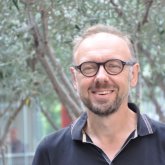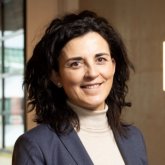High-Temperature Solid Oxide Electrolysers (SOEC) and Protonic Ceramic Electrolysers (PCEC) are promising technologies with the potential to reduce the electrical energy consumption by 30% compared to conventional low temperature electrolysers. The elevated operating temperatures, typically above 450°C, also allow for synergies with industrial production processes (e.g. steel, ammonia, etc.) where waste heat or steam is available. However, the high degradation rates during operation, particularly under intermittent loads, remain a barrier for accelerated scale-up and deployment of these technologies. Thus, more than ever, it is vital to get in-operando information of cell behaviour beyond the usual electrochemical performance measurements, to better understand the various degradation modes and propose design and control strategies to mitigate them.
As part of the ~50 Mio€ ‘HyPRO’ project, the largest ever R&D project on green hydrogen in the Netherlands bringing together 58 partners from research and industry, we are looking for a PhD candidate to develop and execute in-operando SOEC and PCEC characterisation studies. The candidate will design and construct a new cell testing setup, building off existing setups in our lab, that will allow single cell testing at high temperatures (450-1000 oC) and pressurized conditions (1-10 bar) while providing optical access, e.g. via a quartz/sapphire window, to the cell. Aside from standard current-voltage and EIS measurements, the setup should facilitate IR imaging and vibrational spectroscopy (e.g. Raman) to monitor in (close to) real-time thermal and compositional variations across the cell, including local anomalies such as hot spots, and cracks. Combined with pre- and post-mortem microstructural (FIB-SEM, XCT) and compositional (EDX, XRD, XPS) characterisation, these operando studies will help correlate operating parameters, i.e. applied current/potential, feed composition and flow rates, and temperature ramp rates and fluctuations, to cell degradation indicators, such as changes in electrode composition, triple phase boundary length, charge conductivity, etc. Powered by this understanding, the candidate will then be responsible for proposing cell design and control strategies (steam and air/power/thermal) to reduce cell degradation, especially under intermittent operation, and verify them over stability tests = 2000 h.
Information and application
Your application should include
* a 1 A4 page cover letter, emphasizing why you would be a good fit for the position,
* a detailed CV including the name and e-mail address for at least two references, and
* academic transcripts of B.Sc. and M.Sc. education.
An interview (or two) comprising of a scientific presentation followed by discussion will be part of the selection procedure. Following a pre-selection, short-listed candidates will be invited for interviews 1-2 weeks after the application deadline.
For more information and/or specific questions about the position, you are welcome to contact Dr. Aayan Banerjee (a.banerjee@utwente.nl). However, please do not send applications to this email address or via LinkedIn. They will not be taken into consideration.
You can apply via the button below.
About the department
You will be a part of the Sustainable Electrochemical Engineering and Digitalisation SEEDlab. SEED is co-hosted by the research groups Catalytic Processes and Materials and Inorganic Membranes in the Faculty of Science and Technology at the University of Twente. At SEED, you will join a team of 10 highly motivated PhD and Post-Doctoral researchers all working to accelerate electrochemical technology development for the low carbon energy and materials transition by bridging nano-scale physics to industrial-scale systems.
About the organisation
The Faculty of Science & Technology (Technische Natuurwetenschappen, TNW) engages some 700 staff members and 2000 students in education and research on the cutting edge of chemical technology, applied physics and biomedical technology. Our fields of application include sustainable energy, process technology and materials science, nanotechnology and technical medicine. As part of a people-first tech university that aims to shape society, individuals and connections, our faculty works together intensively with industrial partners and researchers in the Netherlands and abroad, and conducts extensive research for external commissioning parties and funders. Our research has a high profile both in the Netherlands and internationally and is strengthened by the many young researchers working on innovative projects with as doctoral candidates and post-docs. It has been accommodated in three multidisciplinary UT research institutes: Mesa+ Institute, TechMed Centre and Digital Society Institute.





